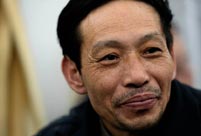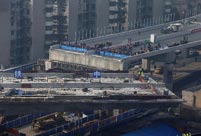 Cockfighting show staged in E. China's Heze during Spring Festival
Cockfighting show staged in E. China's Heze during Spring Festival
 Chinese New Year Flower Fair opens in San Francisco
Chinese New Year Flower Fair opens in San Francisco
 Festivities in Shanghai
Festivities in Shanghai
 PLA navy conducts drill in North China Sea
PLA navy conducts drill in North China Sea
 World's high-tech hotels
World's high-tech hotels
 Li Na poses with trophy on Brighton Beach in Melbourne
Li Na poses with trophy on Brighton Beach in Melbourne
 Six Chinese divers back safely after 300-meter saturation dive
Six Chinese divers back safely after 300-meter saturation dive
 Traditional wedding ceremony of Yao people
Traditional wedding ceremony of Yao people
 Taipei Game Show attracts geeky gamers
Taipei Game Show attracts geeky gamers
Seven, improving leading and working mechanisms for anti-corruption efforts. Fighting corruption has always been a widely discussed topic inside and outside the Party. We are now mainly challenged in the following problems: Anti-corruption forces performing functions separately makes it difficult to build up synergy; some cases are not dealt with resolutely; and the accountability system is too lax to handle reoccurring corruption cases.
The Decision lays out plans for promoting innovation in the anti-corruption mechanisms and institutions, and strengthening institutional guarantees. The main points are: Strengthening the Party's unified leadership to build a clean and honest government and combat corruption; ensuring that the Party committees shoulder the major responsibility and the commission for discipline inspection takes the responsibility for supervision, and working out and implementing a feasible accountability system; improving the leading and working mechanisms for anti-corruption efforts, reforming and improving the function of anti-corruption coordination groups at all levels, and leaving the investigation of corruption cases mainly to commissions for discipline inspection of higher levels; strengthening the leadership role of the higher levels over the lower levels of the discipline inspection commissions, and the simultaneous reporting of the related investigation process to the Party committee at the same level and the commission for discipline inspection at the next-higher level; and fully ensuring that the Central Commission for Discipline Inspection dispatch resident discipline inspection agencies to the central-level departments of the Party and the government, and improving the discipline inspector system at both the central and local levels, so that it covers all regions, all sectors, and all enterprises and public institutions.
All these measures are based on past experience and the opinions of various groups and individuals.
Eight, accelerating the improvement of the leadership for the management of the Internet. Internet and information security bear on national security and social stability, and pose new challenges for us in many aspects.
Falling behind the rapid development of Internet technology and applications, our current management of the Internet is seriously flawed and cannot function properly. Different administrative bodies engaged in multi-channel management of the Internet, overlapping functions and mismatch between powers and responsibilities – all these have led to inefficient management. Also, as the Internet grows into a new form of media, the management of this online medium and the industry is lagging far behind the development of the business. With fast growth in the users of micro-blogs, WeChat and other social network services and instant communication tools, which spread information quickly and can mobilize large numbers of users, how to strengthen oversight within a legal framework and guide public opinion, and how to ensure the orderly dissemination of online information, while at the same time safeguarding national security and social stability have become pressing problems for us.
The Decision stipulates that we must adhere to the principles of active usage, scientific development, management in accordance with the law and ensuring safety in strengthening management of the Internet in accordance with the law, and accelerating the improvement of leading institutions for Internet management. The aim of this is to integrate the functions of the related departments and form joint forces in the management of the Internet covering both technology and contents, and ranging from daily security to combating crimes, to ensure correct and safe Internet usage.
Nine, establishing the Council of State Security. National security and social stability form the basis for further reform and progress. Currently we are challenged by pressure from two sources: Internationally we must safeguard state sovereignty, national security and our development interests, and domestically we need to maintain political and social stability. All kinds of foreseeable and unforeseeable risks are increasing significantly, but our security system is not good enough to meet the demands of ensuring national security. We need to establish a strong platform to coordinate our security work. For this purpose, establishing a state security council to strengthen unified leadership of national security at the central level has become an urgent matter. The main responsibilities of the Council of State Security are to formulate and implement national security strategy, promote the national security legislation, design principles and policies for national security work, and discuss and resolve key issues concerning national security.
Ten, improving the country's natural resources management system and oversight system. Improving the country's natural resources management system is an important reform for developing the property right system for natural resources. It is also the intrinsic requirement for building an ecologically friendly country with complete supporting systems.
Some of our major frustrations in ecological protection are caused by problems in the ecological management system. One problem lies in the undefined ownership of natural resources by the whole people, which leads to problems in the identification of the rights and interests of the owners. To solve this problem, the Decision puts forth measures for improving the natural resources management system. The guiding thoughts are: Ensuring people's property rights to natural resources according to the principle of separation between ownership and management, one issue belonging to one department, and establishing a unified responsibility mechanism for people who act on behalf of the public to manage public natural resources assets.
There is a difference between the state's exercise of power and management over the natural resources assets owned by the whole people and the state's supervision and management of the natural resources within its territory. The former is the owner's right, while the latter is the manager's right. This thus requires us to improve the system of oversight of natural resources, and fulfill the duties as the manager of our territorial space. The owners of state-owned natural resources assets and the managers of state natural resources must act independently, while cooperating with and supervising each other.
We need to realize that our mountains, waters, forests, farmlands and lakes form a community of life. The lifeline of the people comes from the farmland, that of the farmland comes from the water, that of the water comes from the mountain, that of the mountain comes from the earth, and that of the earth comes from the tree. To control the exploitation of natural resources and restore the ecosystem, we must follow the laws of Nature. If people only tend to their own responsibilities, for example, growing trees, regulating rivers or protecting farmlands in isolation, they are prone to gaining in one area and losing in another, which eventually leads to systemic destruction of the ecology. Therefore, it is of the utmost importance to put one department in charge of the usage of the entire territory of a country, and carry out unified protection and restoration programs for its natural resources.
Eleven, establishing the Leading Group for Deepening Reform Comprehensively under the CPC Central Committee. Deepening reform comprehensively is a complicated systems engineering project, which requires more than one or several departments to carry out. Therefore, leadership at a higher level should be established for this purpose. The Decision stipulates that the Party Central Committee will set up the Leading Group for Deepening Reform Comprehensively. This is to give better play to the Party's core function as leader having a picture of the whole situation and as chief coordinator of different aspects, so as to ensure the reform progresses smoothly and the tasks are implemented as planned. The main responsibilities of this leading group are planning key national reforms, promoting coordinated reforms in various fields, coordinating various forces into a joint force for reform, strengthening supervision and oversight, and promoting full implementation of the reform's aim and tasks.


 A 60-hour journey home
A 60-hour journey home Int'l Snow Sculpture Art Expo
Int'l Snow Sculpture Art Expo Highlights of China's air force
Highlights of China's air force Airline crew stage flashmob dance at Kunming airport
Airline crew stage flashmob dance at Kunming airport Top15 countries to retire to in 2014
Top15 countries to retire to in 2014 Hot supermodel's new photo album released
Hot supermodel's new photo album released Asia's heaviest box girder finishes 'rotation' in Wuhan
Asia's heaviest box girder finishes 'rotation' in Wuhan Completed facade of People's Daily new headquarters
Completed facade of People's Daily new headquarters Chinese-branded car passes North America standard safety test for the first time
Chinese-branded car passes North America standard safety test for the first time Li Na beats Bouchard to reach Australian final
Li Na beats Bouchard to reach Australian final  Explore the sources of PM 2.5
Explore the sources of PM 2.5 Highlights of Chinese airborne troops'exercises
Highlights of Chinese airborne troops'exercises  'Living in ice house' competition held in central China
'Living in ice house' competition held in central China  Chinese figure in Oscar nominations
Chinese figure in Oscar nominations  Top ten aerospace events in China 2013
Top ten aerospace events in China 2013Day|Week|Month